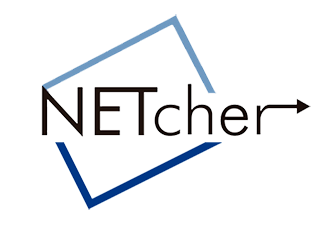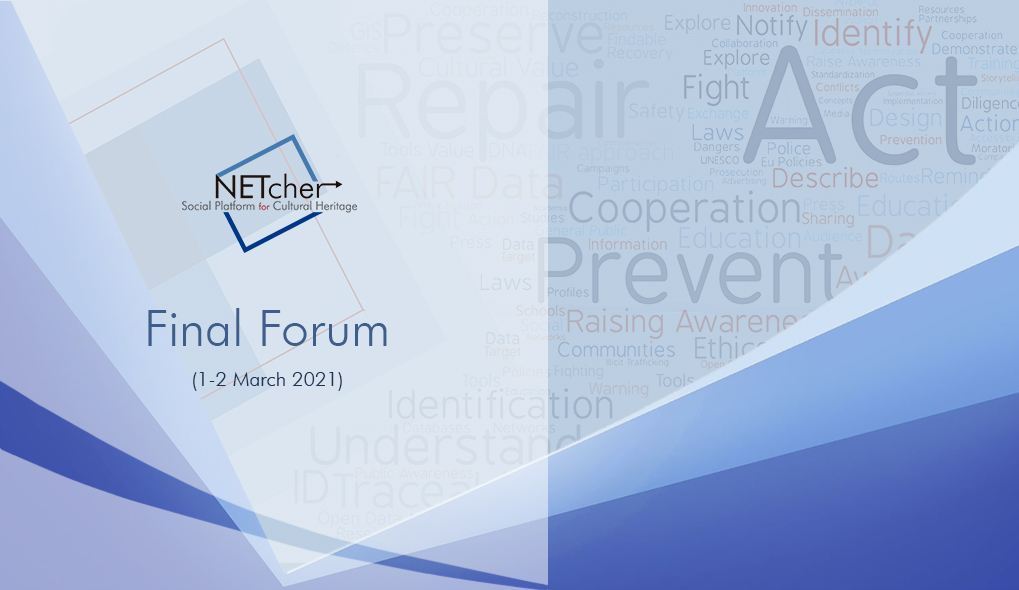NETCHER was pleased to gather 100+ people from 33 countries for its second and final Forum, held online on 1 and 2 March 20221. The NETCHER Consortium would like to warmly thank the large panel of experts and attendees for sharing questions, experiences and practices through these two intensive days of presentations and discussions!
The Final Forum was the occasion to present the project’s achievements, discuss them with the involved stakeholders, and identify new roads for implementation.
Day 1 of NETCHER Final Forum
Day 1, dedicated to the Recommendations to Professionals, started, after welcoming remarks introducing the agenda and the rules for attending the online conference, with a presentation of the NETCHER consortium, highlighting the different competences present in the partner group. A short overview of the project achievements has been then presented by the consortium members, who detailed the results and outcomes prepared collectively by the project team.
The Forum continued with a presentation of NETCHER’s final recommendations, one of the highlights of the project’s Final Forum. The aim was twofold: to present the results of several months of work by the entire NETCHER community to identify the gaps in the fight against the illicit trafficking of cultural goods and to propose solutions to fill them, but also to summarize, in a didactic way, the essence of this scientific contribution, to make it intelligible to the representatives of the European Commission’s Directorates-General, as well as to the general public. The 194 recommendations of the project were presented in four axes (Understand, Prevent, Act, Repair) by a binomial consisting of a NETCHER expert and a member of its consortium.
A round table then gathered representatives of five Directorates-General of the European Commission, who were requested to comment the recommendations issued by the NETCHER project and highlighted the policy issues related to fighting the looting and trafficking of cultural goods from different perspectives.
Finally, a poster session gathering thirteen cultural heritage projects, from European projects, academic researchers, public institutions and non-governmental organisations was held and closed the day.
Day 2 of NETCHER Final Forum
Day 2 was dedicated to “Cultural Heritage Crime in the Spotlight”. After a short introduction of the day, a representative from Europol took the floor to present the exact role and mandate of this European agency, in particular regarding the protection of cultural heritage against crime. He recalled the successful operations led by his organisation and stressed the importance of cooperation with experts as a key law enforcement challenge. This is notably the case of the collaboration of NETCHER in the 2020 PANDORA operation.
This presentation was followed by a round table to address the issue of communication and awareness raising on the illicit trafficking of cultural property. Its objective was to give the floor to key stakeholders and players that are active in the fight against illicit trafficking of cultural goods and also to communication specialists to gather their input as a major contribution for the final outputs of the project that will systematize and structure a proposal for research roadmaps and targeted policies to address this issue. Among the topics discussed, communication on social networks aimed at young people, the role of the media in presenting trafficking in cultural goods in a positive light and the need to enhance the value of cultural goods beyond the pecuniary aspect took centre stage.
The afternoon session of the Forum’s second day was dedicated to raising public awareness on illicit trafficking and cultural heritage issues. NETCHER’s Venetian Unit, despite the Covid-19 pandemic, wished to offer a glimpse of Venice by presenting the afternoon live session from the impressive set of Mocenigo Palace Museum. Introduced by a Master of Ceremony, five renowned professionals presented their experience.
Finally, The Science Gallery of Venice presented four works of art, chosen to compose a virtual exhibition: the Hydria of the Micali Painter (illicit excavation and trade), the Portrait of a Lady by Klimt (theft), the Severan Arch in Palmyra (destruction by conflict/ideology) and the Wedding of Cana by Veronese originally in the Refectorio by Palladio in Venice (war booty). The exhibition highlighted the links between the development of new technologies and the protection of Cultural Heritage.
Thanks to all participants!
Despite the Covid-19 pandemic and the need to hold the last NETCHER event online, the Final Forum was a success, thanks to the participation of many experts and the presence and support of the public.
The Final Forum report will be available soon.
Stay tuned!

